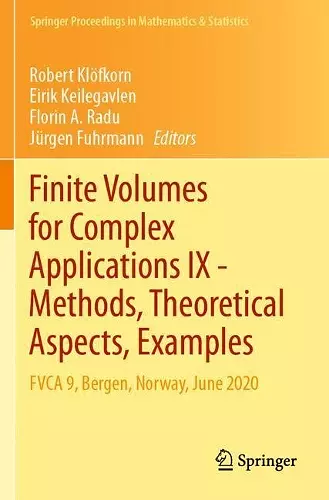Finite Volumes for Complex Applications IX - Methods, Theoretical Aspects, Examples
FVCA 9, Bergen, Norway, June 2020
Robert Klöfkorn editor Eirik Keilegavlen editor Florin A Radu editor Jürgen Fuhrmann editor
Format:Paperback
Publisher:Springer Nature Switzerland AG
Published:11th Jun '21
Currently unavailable, our supplier has not provided us a restock date
This paperback is available in another edition too:
- Hardback£89.99(9783030436506)

The proceedings of the 9th conference on "Finite Volumes for Complex Applications" (Bergen, June 2020) are structured in two volumes. The first volume collects the focused invited papers, as well as the reviewed contributions from internationally leading researchers in the field of analysis of finite volume and related methods. Topics covered include convergence and stability analysis, as well as investigations of these methods from the point of view of compatibility with physical principles. Altogether, a rather comprehensive overview is given on the state of the art in the field. The properties of the methods considered in the conference give them distinguished advantages for a number of applications. These include fluid dynamics, magnetohydrodynamics, structural analysis, nuclear physics, semiconductor theory, carbon capture utilization and storage, geothermal energy and further topics. The second volume covers reviewed contributions reporting successful applications of finite volume and related methods in these fields.
The finite volume method in its various forms is a space discretization technique for partial differential equations based on the fundamental physical principle of conservation. Many finite volume methods preserve further qualitative or asymptotic properties, including maximum principles, dissipativity, monotone decay of free energy, and asymptotic stability, making the finite volume methods compatible discretization methods, which preserve qualitative properties of continuous problems at the discrete level. This structural approach to the discretization of partial differential equations becomes particularly important for multiphysics and multiscale applications.
The book is a valuable resource for researchers, PhD and master’s level students in numerical analysis, scientific computing and related fields such as partial differential equations, as well as engineers working in numerical modeling and simulations.
ISBN: 9783030436520
Dimensions: unknown
Weight: unknown
775 pages
2020 ed.